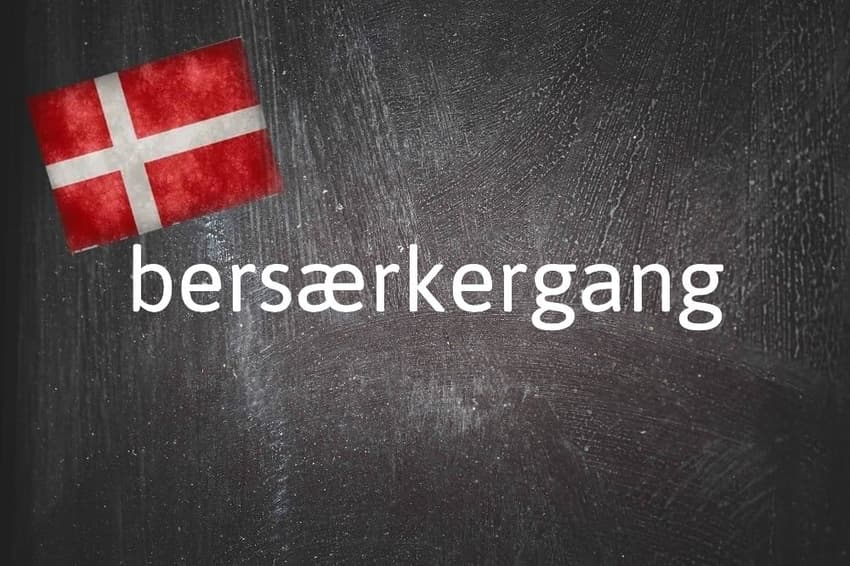Danish word of the day: Bersærkergang

Photo by Francesco Ungaro on Unsplash and Nicolas Raymond/FlickR
Don’t flip out and go berserk, read today’s Danish word of the day.
What is bersærkergang?
Bersærkergang originally meant ‘the walk of a berserker’ or in other words the violent rampage of a berserker – a vicious warrior in Old Norse literature – during combat.
Today it means ‘a violent rampage during a fit of rage’ but can also describe various kinds of disorderly behaviour (not necessarily violent) by anyone at all.
Imagine, for instance, someone that barges into the office and starts moving around furniture without any concern for whoever is working there at the moment. You might accuse them of enacting a bersærkergang.
There is much myth surrounding the actual berserkers of the Viking age, and their origin is even older.
Rooted in the old Germanic mythology that predated the Vikings, the bersærker was a warrior devoted to Odin/Wotan, the king of gods. A warrior who, according to legend would attack the enemy during battles while roaring in a fit of ecstatic rage, and who was supposedly impervious to enemy attacks.
Why do I need to know bersærkergang?
The modern Danish word is a descendant of the Old Norse word berserkr. This word may have originally meant either ‘bear shirt’ or ‘bare of shirt’, that is, wearing no shirt. There are depictions of berserkers both naked and with bear pelts and chain mail.
Whatever they actually wore in battle, they are often described as large men wearing a bear’s pelt or even as actual bears in some instances – berserkers were also thought to be shapeshifters.
The stories surrounding berserkers are many. It is said they induced their state with fly agaric mushrooms or alcohol, but the symptoms of frothing at the mouth, biting one’s shield, and flying into a fit or rage are more consistent with the use of henbane, a poisonous plant.
Symptoms of post-traumatic stress disorder or even epilepsy and other mental illnesses have also been put forward as potential explanations for the legendary warlike state of the berserkers.
If you see someone cause a bit of a mayhem, preferably without injuring anyone or destroying public or private property, but perhaps being rowdy and too loud– then you can say that they gik bersærkergang (‘went berserking’).
A shortened version of this which you might also hear in Danish – and can be used ironically – is gik bersærk. This should be recognisable to English speakers, since it directly translates to “went berserk”.
Comments
See Also
What is bersærkergang?
Bersærkergang originally meant ‘the walk of a berserker’ or in other words the violent rampage of a berserker – a vicious warrior in Old Norse literature – during combat.
Today it means ‘a violent rampage during a fit of rage’ but can also describe various kinds of disorderly behaviour (not necessarily violent) by anyone at all.
Imagine, for instance, someone that barges into the office and starts moving around furniture without any concern for whoever is working there at the moment. You might accuse them of enacting a bersærkergang.
There is much myth surrounding the actual berserkers of the Viking age, and their origin is even older.
Rooted in the old Germanic mythology that predated the Vikings, the bersærker was a warrior devoted to Odin/Wotan, the king of gods. A warrior who, according to legend would attack the enemy during battles while roaring in a fit of ecstatic rage, and who was supposedly impervious to enemy attacks.
Why do I need to know bersærkergang?
The modern Danish word is a descendant of the Old Norse word berserkr. This word may have originally meant either ‘bear shirt’ or ‘bare of shirt’, that is, wearing no shirt. There are depictions of berserkers both naked and with bear pelts and chain mail.
Whatever they actually wore in battle, they are often described as large men wearing a bear’s pelt or even as actual bears in some instances – berserkers were also thought to be shapeshifters.
The stories surrounding berserkers are many. It is said they induced their state with fly agaric mushrooms or alcohol, but the symptoms of frothing at the mouth, biting one’s shield, and flying into a fit or rage are more consistent with the use of henbane, a poisonous plant.
Symptoms of post-traumatic stress disorder or even epilepsy and other mental illnesses have also been put forward as potential explanations for the legendary warlike state of the berserkers.
If you see someone cause a bit of a mayhem, preferably without injuring anyone or destroying public or private property, but perhaps being rowdy and too loud– then you can say that they gik bersærkergang (‘went berserking’).
A shortened version of this which you might also hear in Danish – and can be used ironically – is gik bersærk. This should be recognisable to English speakers, since it directly translates to “went berserk”.
Join the conversation in our comments section below. Share your own views and experience and if you have a question or suggestion for our journalists then email us at [email protected].
Please keep comments civil, constructive and on topic – and make sure to read our terms of use before getting involved.
Please log in here to leave a comment.